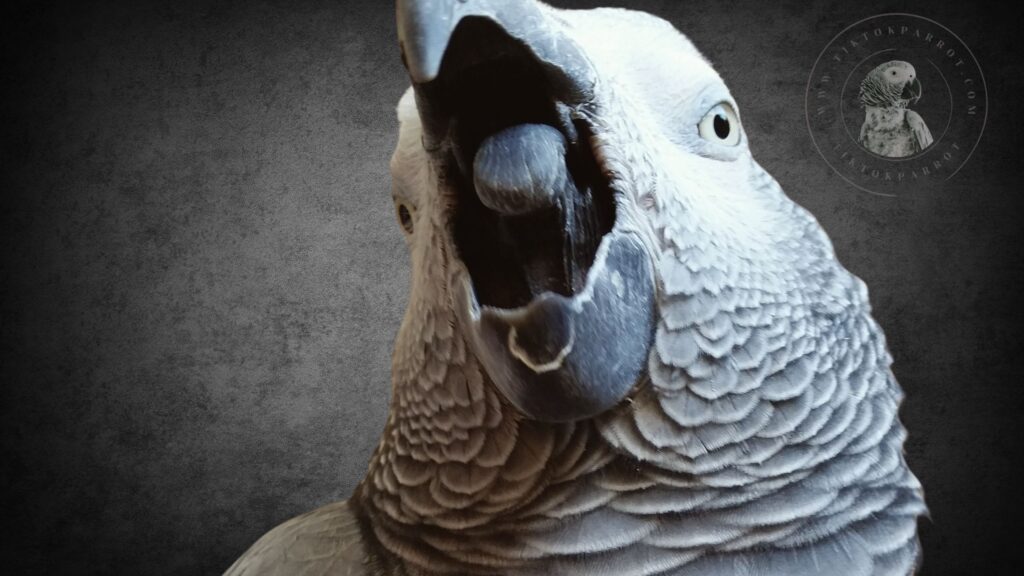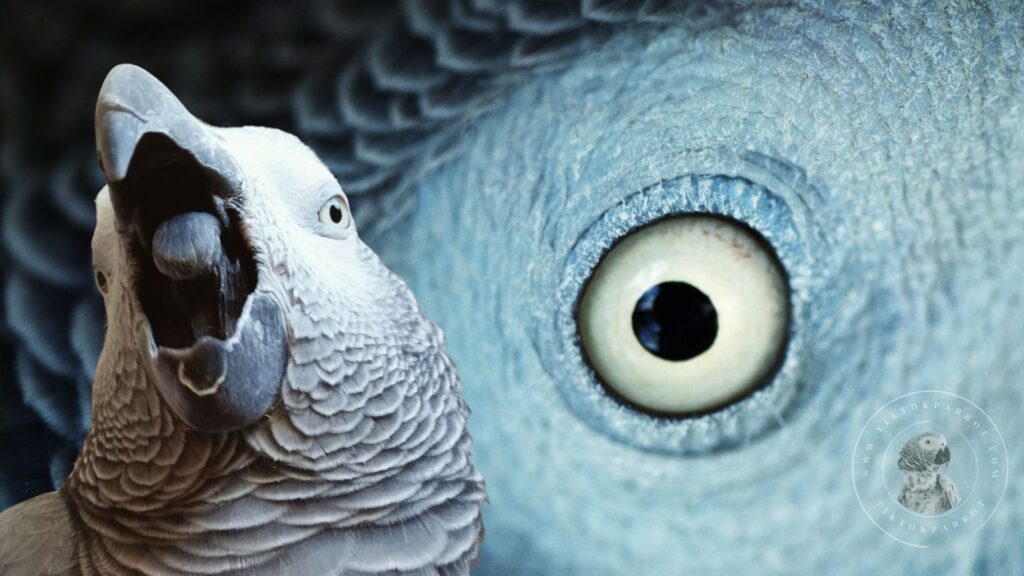The Tongue Truth Of African Grey Parrot!
Hey there, parrot peeps, and welcome to TiktokParrot.com! We all know our African grey parrots are intelligent, chatty, and can mimic our bad jokes with impressive accuracy.
But have you ever stopped to wonder about their unique physical features, like that striking black tongue? Unlike our pink fleshy appendages, an African grey’s tongue is a sleek, dark mystery. So, what’s the deal with the black tongue? Is it a secret superpower, a fashion statement, or something else entirely?
Ah, the African grey parrot – a mesmerizing creature with its smoky plumage and piercing gaze. But amidst its captivating beauty lies a peculiar mystery that has puzzled parrot enthusiasts for generations: Why does the African grey parrot sport a distinctive black tongue? Join us as we embark on a journey to unravel this enigmatic trait, delving deep into the avian world to uncover the secrets behind this curious phenomenon.
Buckle up, because we’re about to dive into the fascinating world of avian anatomy and unveil the truth behind the black tongue!
Unlocking the Mystery: Why Does Your African Grey Parrot Have a Black Tongue?

First things first, let’s set the stage. Picture yourself in the heart of Africa, surrounded by the lush canopy of the rainforest. Here, amidst the cacophony of wildlife, resides the African grey parrot, a master of mimicry and a beloved companion to many. But as you observe these majestic birds, you can’t help but notice their striking feature – a tongue as dark as night.
Now, you might be wondering, what purpose does this ebony appendage serve? Is it merely a quirk of nature, or does it hold a deeper significance? Well, dear reader, prepare to be enlightened.
One theory suggests that the African grey parrot’s black tongue is an adaptation to its diet. In the wild, these birds are known to feast on a variety of fruits, nuts, and seeds, many of which contain tannins and other compounds that can stain the tongue.
By sporting a dark-colored tongue, the African grey parrot may have evolved to camouflage any discoloration caused by its culinary adventures, allowing it to blend seamlessly into its surroundings and evade potential predators.
But the mystery doesn’t end there. Some experts believe that the black pigment in the African grey parrot’s tongue may also play a role in thermoregulation, helping to dissipate excess heat and maintain optimal body temperature in the sweltering African climate. It’s a fascinating hypothesis that highlights the remarkable adaptability of these remarkable birds.
Of course, no discussion of the African grey parrot’s black tongue would be complete without a nod to its endearing charm. After all, who can resist the allure of those soulful eyes and that mischievous grin? Whether it’s performing acrobatic feats or engaging in lively banter, these intelligent creatures never fail to captivate and entertain.
Now let’s clear up a misconception: a black tongue isn’t exclusive to African greys. Many parrot species, like Amazons, Cockatoos, and even some Macaws, sport this unique feature. It’s kind of like a cool club for feathered friends! But why black, you ask? Here are some of the leading theories:
- Melanin Magic: Melanin is the same pigment that gives us humans our skin and hair color. It’s also present in feathers and, you guessed it, tongues! Scientists believe melanin in the tongue might offer protection from harsh foods or even act as a natural antibiotic, helping these parrots stay healthy. Think of it like a built-in germ shield – pretty cool, right?
- Tasteful Adaptation: Some experts suggest the black tongue might play a role in taste perception. Maybe it helps them distinguish between different flavors, like a parrot’s version of having a super-sensitive palate (imagine the bragging rights!). While more research is needed, this theory adds another layer of intrigue to the black tongue mystery.
- The Evolutionary Enigma: Evolution is all about survival of the fittest, and some scientists believe the black tongue might be a leftover trait from a distant ancestor. Perhaps it offered some advantage in the wild that isn’t as crucial today, but it stuck around anyway. Think of it like a historical footnote written on their tongue – a reminder of where they came from.
Now, let’s address the elephant in the room (or rather, the black tongue in the beak): does the color of their tongue tell you anything about their health? The good news is that a healthy African grey’s tongue should be a smooth, consistent black.
However, if you notice any changes in color, texture, or if your parrot seems to be having trouble using their tongue, it’s always best to consult an avian veterinarian. Early detection is key to keeping your feathered friend happy and healthy!
African grey sticking tongue out
Ah, the classic African grey behavior of sticking their tongue out! It’s a sight that never fails to bring a smile to our faces. Whether they’re goofing around, showing off their playful side, or simply expressing themselves, watching an African grey stick out its tongue is always a delightful moment. So, why do they do it? Well, it could be a sign of happiness, excitement, or even just a playful gesture. Whatever the reason, one thing’s for sure – it’s guaranteed to brighten your day!
How long is the tongue of an African Grey Parrot?
The tongue of an African grey parrot typically ranges from 3 to 4 inches in length. This impressive appendage is not only long but also incredibly flexible, allowing these birds to manipulate food and mimic sounds with remarkable precision. So, while they may be small in size, African grey parrots certainly pack a punch when it comes to tongue length!
We can say the black tongue of the African grey parrot is more than just a cool conversation starter. It’s a testament to their unique biology and a reminder of the fascinating adaptations that have helped these birds thrive for centuries.
My Closing Thoughts
Overall I would say, the African grey parrot’s black tongue remains a captivating enigma, a testament to the beauty and complexity of the natural world. As we marvel at this remarkable adaptation, let us also celebrate the enduring spirit of curiosity and wonder that defines our relationship with these extraordinary birds.
I hope you enjoyed this deep dive into the mystery of the African Grey Parrot’s black tongue!
Have you ever noticed anything interesting about your African Grey’s tongue? Share your experiences and any fun facts you’ve learned in the comments below!
Also you are welcome to join our pet community, at TiktokParrot community, we’re all about building a vibrant community of pet lovers where you can share your experiences, seek advice, and connect with fellow pet enthusiasts.
If you found this blog helpful, It would be great if you could share it with your family and friends who might find it useful as well.
You might like to read these as well 🙂
Uncover the Fascinating World of Parrot Tongue Anatomy and Function
African Grey Parrot Taste Sense: Taste Bud Adventures
Poop or Perch: Understanding Your Parrot’s Bathroom Body Language
What To Do If Your Parrot Is Choking, something stuck in the throat?
Things you need to know about an African Grey Parrot’s Cage
The Importance of a Cage for Your African Grey Parrot
Keeping African Greys with Other Pets
For more useful content about African grey parrots, you can subscribe my site with your email to get notification upon publishing a new blog, the subscribe box you can see on the right side of this page. Also if you get an alert on your web browser while browsing my site, allow it and that will also give you an alert whenever I publish a new blog. 🙂
Stay safe and much love!



